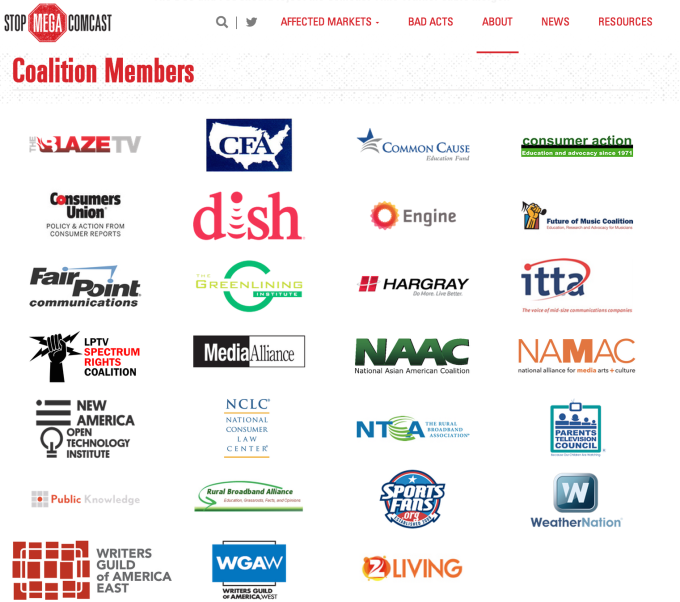Opposition to Comcast Merger Still Grows

The members of the “Stop Mega Comcast Coalition.” Graphic courtesy of Consumerist.
The Federal Communications Commission may be in the home stretch of reviewing Comcast’s proposed merger with Time Warner Cable, but formal opposition to the deal keeps growing.
Consumerist reports that the “Stop Mega Comcast Coalition” has grown from 12 to 27 members in recent weeks. The group includes Comcast competitors like Dish, as well as the Writers Guild of America — worried that its members might find fewer outlets to pitch their wares — and strange bedfellows like Glenn Beck’s The Blaze linking up with Common Cause in opposition to the merger.
CU Policy Counsel Delara Derakhshani says that consumers, especially those who have been customers of either of these cable TV giants, have good reason to be skeptical that the two lowest-rated cable and broadband providers in the country would somehow be better together.
“Both Comcast and Time Warner Cable are notorious for poor customer service and arbitrary price hikes – issues which are bound to persist, if not increase, under Mega Comcast’s regime,” explains Derakhshani. “By joining this coalition, we hope to sound the alarm on how this merger would lead to higher prices, fewer choices and worse service for consumers.”
Multichannel News offers an additional clarification:
The coalition is concerned that the combined company “will dominate the high-speed broadband market and have the means and incentive to use that dominance to increase prices, act as gatekeeper to consumer access to content and further erode customer service.”
Comcast and Time Warner Cable have argued they need to get together to better compete with competing distributors with national footprints–DirecTV, Dish, Netflix–and that since they don’t compete with each other for broadband subs now, combining their Internet access service will not reduce competition.
In other Comcastic headlines:
Me, the Comcast VIP: Calling Comcast to see when service would be restored was always an ordeal. Once, after three days without service, I called to ask for a rebate on my bill. I was transferred to an office in Delaware where the snarly operator put me on hold, then transferred me to a recording, “We’re sorry, the number you have reached is not in service. Please hang up and try again.” Calling back, I got a recording that Comcast was “experiencing high call volume” and it could be a long wait. That stopped after I wrote a column mocking Comcast and suggesting going with Dish TV. A Comcast rep called me at work and set up an appointment to resolve my service issues. A few days later, two white vans and a crew of five came to my house, tore out all the old cable, rewired the house from one end to the other, including new outlets, and set up my TV. All of it was overseen by a Comcast supervisor, who was very nice and apologized for the commotion. Before the crew left, I was handed a card with the supervisor’s personal phone number, with instructions to call it for any problem. I never did. I knew I was being soft-soaped by Comcast, and said so. (Bucks County Courier Times)
DEMOCRATS LEAHY, MATSUI MOVE TO BAN PAID PRIORITIZATION THROUGH NET NEUTRALITY LEGISLATION: The Online Competition and Consumer Choice Act would require the Federal Communications Commission to ban so-called paid prioritization agreements between a broadband Internet provider and content provider such as Amazon and Netflix. Some consumer advocacy groups have expressed fear that ISPs such as Comcast and Verizon will negotiate agreements that grant content providers speedy access to consumers, or other types of preferential treatment, but leave other websites and Internet services at a disadvantage. The legislation would require the FCC to use its current authority to prohibit paid prioritization agreements that govern the last-mile connection between the ISP and the consumer. Broadband providers also would be precluded from giving preferential treatment to its own or its affiliates’ last-mile Internet traffic. (Channel Partners Online)
[Earlier: Comcast, Netflix Reach Agreement on Streaming]
GOP lawmaker offers bill to block treating Internet as utility: Rep. Bob Latta (R-Ohio) has reintroduced legislation to prevent the Federal Communications Commission to reclassify broadband Internet as a utility. Latta, vice chairman of the House Commerce subcommittee on Communications and Technology, called the FCC’s plans misguided. His legislation notes that the strict regulations were “designed for the monopoly telephone system in 1934 and has its origins in 19th century shipping regulations.” “These businesses thrive on dynamism and the ability to evolve quickly to shifting market and consumer forces,” he said in a statement. “Subjecting them to bureaucratic red tape won’t promote innovation, consumer welfare or the economy.” (The Hill)


